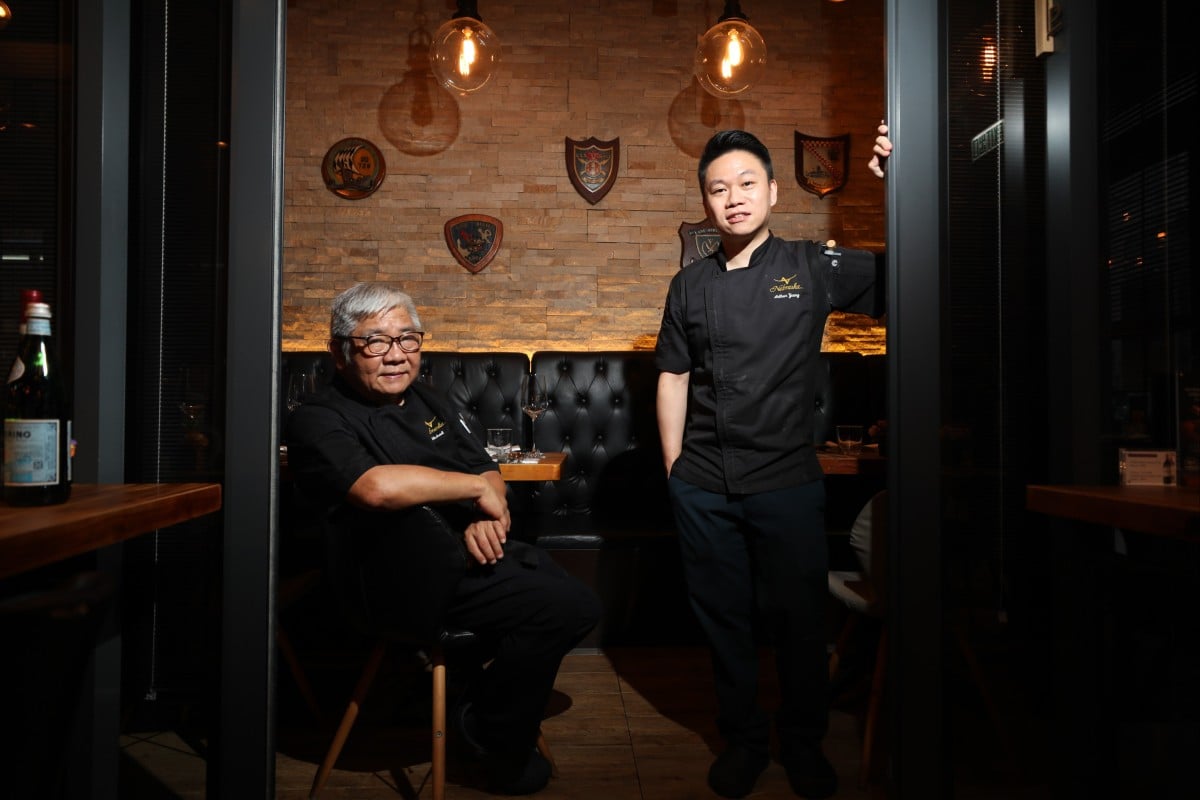 Owners of Nebraska Steakhouse, Michael Yeung (left) and his son Arthur Yeung, are planning to close their restaurant in Wan Chai. Photo: Xiaomei Chen
Owners of Nebraska Steakhouse, Michael Yeung (left) and his son Arthur Yeung, are planning to close their restaurant in Wan Chai. Photo: Xiaomei ChenDeep Dive delves into hot issues in Hong Kong and mainland China. Our easy-to-read articles provide context to grasp what’s happening, while our questions help you craft informed responses. Check sample answers at the end of the page.
After eight years of business, Hong Kong restaurant owner Arthur Yeung has been forced to close his family business.
His Nebraska Steakhouse will close on November 10. The business has lost about HK$5 million since the Covid-19 pandemic began.
During its best years, it even served celebrities, such as Chow Yun-fat and Anthony Wong Chau-sang.
When the city lifted pandemic restrictions and reopened last year, Yeung, 42, hoped customers would return. But the situation only worsened as Hongkongers began visiting mainland China to pay less for eating out and other activities.
“There have been many dead quiet nights without a single diner, especially in February after Lunar New Year and in June,” he said.
“The nearby streets look empty and lifeless with other eateries shutting down for good. I can’t bear to let go, but I am mentally and physically exhausted.”
His restaurant is one of many small and medium-sized enterprises (SME) that have closed in Hong Kong.
A rising number of SMEs are struggling to stay open. Many of them do not have enough cash flow, and they have lost investors and patrons. A spokesman of financial consultant Pure Elite Advisor said many SMEs had cash-flow problems because they already had debts from the pandemic. Many of these business owners feel like the future will not get better.
Their ability to recover is important for Hong Kong’s economic future. This is because 360,000 SMEs make up more than 98 per cent of businesses in the city. They support Hong Kong’s economy by giving jobs to 45 per cent of workers in the private sector.
The city’s economy grew by 3.3 per cent in the second quarter of 2024 compared to the same time last year. But there are other signs of difficult times.
In May, 871 people filed for bankruptcy; this was the highest monthly number of bankruptcies in the past two years, according to official data. The first seven months of 2024 saw 5,279 bankruptcies logged; this was over a fifth more than in the same period last year.
Experts pointed to what had caused SMEs to struggle. In recent years, there have been more disagreements between the United States and China, high interest rates, the property slump in Hong Kong and on the mainland, and many people leaving the city. Retail, catering, manufacturing and construction businesses have been hurt the most.
Staff writers
Question prompts:
1. What are the reasons Yeung had to close his restaurant?
(1) more Hongkongers spending across the border
(2) loss of customers because of the Covid-19 pandemic
(3) competition from larger restaurants
(4) not enough staff members
A. (1), (2) only
B. (1), (2), (3) only
C. (1), (2), (4) only
D. all of the above
2. List TWO problems affecting Hong Kong’s small and medium-sized enterprises and TWO possible reasons.
3. How important are SMEs to the city’s economy? Explain using News and Glossary.
Graphic
Question prompts:
1. List TWO details in the illustration that show the problems facing retail shops.
2. What can the government do to help Hong Kong’s SMEs recover and stop further closures? Explain using News, Glossary and your own knowledge.
Glossary
-
small and medium-sized enterprises (SMEs): businesses that have less money and workers compared to large corporations
-
cash flow: the movement of money in and out of a company. It accounts for revenue, spending and investments. Positive cash flow means that a company is running well and will survive tough times.Answers:
Sample answers
News
1. A
2. They face problems with cash flow because many already had debts from the pandemic. / They have lost of investors because of many people leaving the city. / They have lost patrons because many Hongkongers are going to the mainland to eat out. (accept any reasonable answers)
3. Their ability to recover is crucial for Hong Kong’s economic future. This is because SMEs make up more than 98 per cent of business establishments in the city. They provide jobs for 45 per cent of workers in the private sector. Thus, SMEs are the most important part of Hong Kong’s economy.
Graphic
1. rents are high / there is an empty street with no customers
2. To aid the recovery of Hong Kong’s SMEs and prevent further closures, the government could give financial assistance to these small businesses or ask banks to give them more time to pay back their debts. / Authorities could encourage landlords to reduce rents to make it more feasible for SMEs to survive. / Officials could supporting SMEs in adopting technology to can help them save costs, reach more customers and adapt to changing consumer behaviours.
